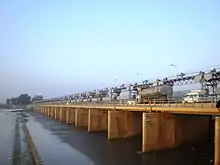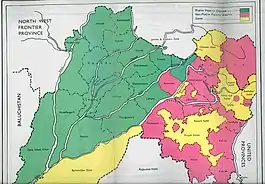Balloki Headworks
Head Balloki or Balloki Headworks is a barrage on the Ravi River in the Punjab, Pakistan. It was first built around in 1915 in British India as part of the 'Triple Canals Project' to feed the Lower Bari Doab Canal. The canal turned in a profit of 24% within ten years (in 1928–29).[1] The original weir has now been rebuilt as a full barrage.

History

The Triple Canals Project was the second irrigation project to be implemented in Punjab, the first being the Upper Bari Doab Canal (UBDC) built in 1875. The Triple Canals project began in 1905. It constructed three canals:
- the Upper Jhelum Canal (UJC) from Mangla
- the Upper Chenab Canal (UCC) from Marala
- the Lower Bari Doab Canal (LBDC) from Balloki.
The Upper Chenab and Lower Bari were linked: the former brought water from Chenab to Ravi, in addition to irrigating lands along the way. This was necessary because, after the extraction of water for the Upper Bari Canal, the remaining waters in Ravi were insufficient for the Lower Bari Canal.[2] This was the origin of the "link canal" concept, bringing waters from the western rivers into the eastern rivers of Punjab, which later became the foundation for the Indus Waters Treaty between present-day India and Pakistan.
Where the Upper Chenab joined the Ravi river from the right, a few miles west of the village of Balloki, the Balloki Barrage was constructed. It was the largest barrage of its kind in India at that time. It had a 1,647-foot-long weir with thirty-five 12-metre-wide steel gates for regulating the water of Ravi. The Lower Bari Doab Canal branched off on the left of the barrage.[2] The canal started supplying water in 1912 and got fully completed in 1917. It irrigated 877,000 acres of land in the Montgomery and Multan districts.[1]
The total cost of the LBDC project was Rs. 22 million. It became profitable within 10 years.[1]
References
- Naqvi, Indus Waters and Social Change (2012), pp. 24–25.
- Headrick, The Tentacles of Progress (1988), p. 192.
Bibliography
- Chaturvedi, Mahesh Chandra (2011), India's Waters: Environment, Economy, and Development, CRC Press, ISBN 978-1-4398-7283-3
- Headrick, Daniel R. (1988), The Tentacles of Progress: Technology Transfer in the Age of Imperialism, 1850-1940, Oxford University Press, ISBN 978-0-19-802178-0
- Naqvi, Saiyid Ali (2012), Indus Waters and Social Change: The Evolution and Transition of Agrarian Society in Pakistan, Oxford University Press Pakistan, ISBN 978-0-19-906396-3